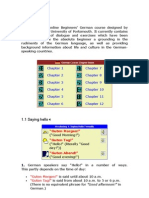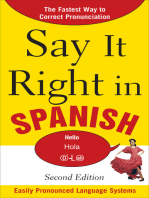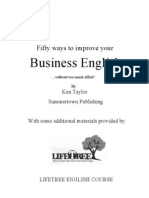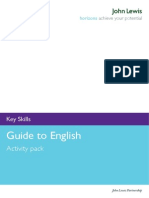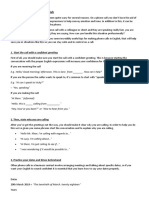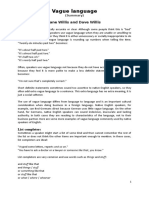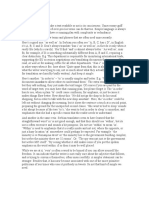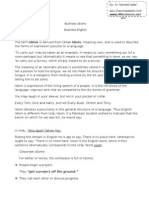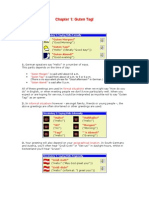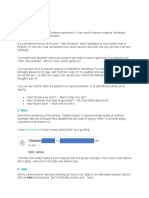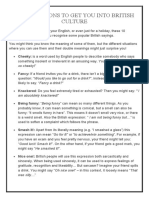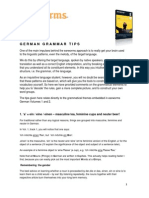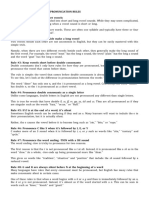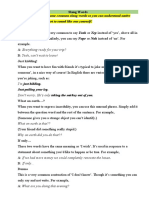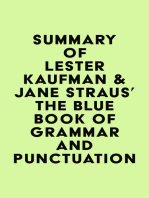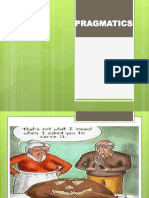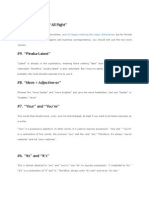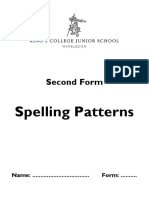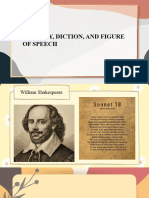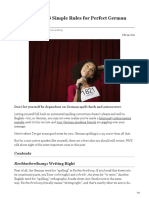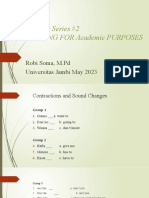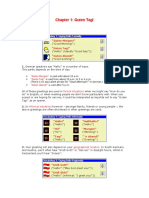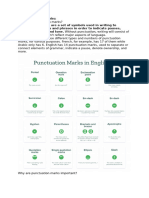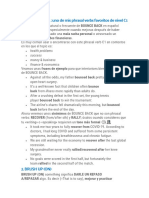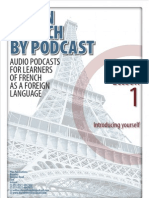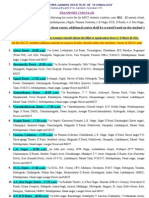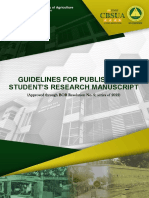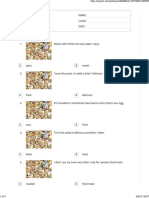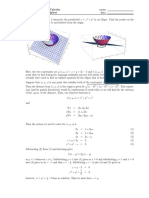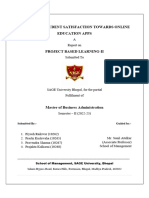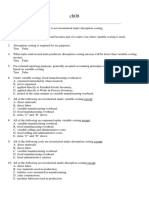Common Mistakes in English
Common Mistakes in English
Uploaded by
linzimansonCopyright:
Available Formats
Common Mistakes in English
Common Mistakes in English
Uploaded by
linzimansonCopyright
Available Formats
Share this document
Did you find this document useful?
Is this content inappropriate?
Copyright:
Available Formats
Common Mistakes in English
Common Mistakes in English
Uploaded by
linzimansonCopyright:
Available Formats
Common mistakes in English made by German speakers
By Mike Seymour
#1. Did you know that, unlike in some other languages, it is NEVER possible to write a country-related
word with a small letter in English? Thus, whether you mean the language, the people or the adjective
you always have to write English, German, French etc.
#2. To English ears it sounds unusual when foreign learners use the phrase'in former times'. Believe it
or not we don't use it. We tend to use a construction with 'used to'. For example do NOT say 'In former
times I lived in Vienna' but say 'I used to live in Vienna' instead.
#3. German executives take note!!! The word 'headquarter' does NOT -- I repeat, NOT -- exist. The
word is always 'headquarters', i.e., with an 's' at the end. The word ends in 's', it has nothing to do with
being singular or plural. An alternative is to use the phrase 'head office' or -- though I personally don't
like it -- 'home office', which some US firms use.
#4. Telecoms executives have often been surprised to discover that their Anglo-Saxon counterparts
look at them in confusion when they mention a 'handy number'!!! In English the word 'handy' means
'useful', 'practical', 'geographically close by', 'easy to use'. It has nothing whatsoever to do with mobile
phones.
#5. Being an abstract concept 'information' is an uncountable noun. Hence the oft-heard words: 'I need
three informations' are NOT correct. You should say: 'I need some information' or 'I need three bits (or
pieces) of information'.
#6. One for the stockbrokers out there: there is a verb, 'to go public' in English meaning 'to float' or 'to
be listed on the stock market for the first time' but there is NO corresponding noun. You should refer to
the 'flotation' of a company or the 'IPO' (initial public offering).
#7. In English you begin the body of a letter with a capital letter even though you have followed your
salutation (e.g., Dear Mrs Paxton) with a comma. This is WRONG: 'Dear Mrs Paxton, thank you for
your letter dated.... etc.' The word 'Thank' should be capitalised.
#8. When describing figures and trends many foreign learners often confuse 'to raise' (transitive) and
'to rise' (intransitive) . If you use 'to increase', which can be used in both senses, you will avoid the
mistake.
#9. Another word that can lead to mistakes is 'vocabulary', which is a collective noun that means 'a
collection of words or phrases'. You should NOT talk about 'learning your vocabularies' as this is
incorrect.
#10 In English politicians, filmstars and other famous people are sometimes known as VIPs. However
we do NOT make the abbreviation into a word [i.e., 'VIPP's] we say the three letters separately, i.e.,
[Vee Eye Pee]. See also Tip #189
#11 Be careful when using the word 'eventually'. If you say something will 'eventually happen' you
mean that it is certain to happen but that it will happen sometime a long way off in the future. It does
not express possibility or uncertainty about an event happening!
#12 In English the corporate telephone number you call because you have a problem or you want to
make an inquiry is often called a 'helpline', not a hotline.
#13 If men go to a formal dinner or perhaps to a wedding or ball they have to wear special clothes: the
jacket is called a 'dinner jacket' (DJ ) or a Tuxedo (Tux) in American English. It is usually worn together
with a 'bow tie'.
#14 In English December 24th is known as Christmas Eve, December 25th as Christmas Day and
December 26th as Boxing Day.
1
#15 Don't confuse 'to be ready ' and 'to be finished' as they have quite different meanings: You would
say 'I am ready' AFTER you have spent time preparing something but BEFORE you do it. Hence it
means: OK - we can start or leave now! 'I've finished' is said AFTER an event, i.e. after answering
question 25 in a 25-question exam.
#16 When talking about your age it is not necessary to add the words '... years of age'. So 'I am 33' is
enough and sounds perfectly correct. 'I am 33 years' is WRONG!
#17 It is very old-fashioned nowadays to say "it's raining cats & dogs". 'It's pouring (down)' or 'it's
bucketing it down' are more common.
#18 Be careful when using the word 'respectively'. It is used to link two pairs of things such as names,
ages, figures etc. For example a mother could say "My two sons J amie & Michael are 27 and 33
respectively". Therefore you know that the first age goes with the first name (J amie is 27) and the
second age with the second name (Michael is 33). Or she could say "My two sons J amie & Michael
studied in Sheffield and Edinburgh respectively". Or you could use it to talk about sales. Sales rose in
1998 and 1999 by 10% and 15% respectively. Please note too that the word is placed at the end of
the sentence.
#19 The abbreviation i.e., means 'that is' and comes from the Latin 'id est'. It does NOT mean 'in
example'!
#20 Though the distinction is fading somewhat these days there are rules to apply when beginning
and ending a business letter. If you address the person by name, e.g., 'Dear Mr Cassidy' you should
end the letter with 'Yours sincerely'. If you do not know the addressee's name and write 'Dear
Sir/Madam' you should end with 'Yours faithfully'.
#21 We do NOT say shares or stocks or a stake 'of' a company; it is more correct to say shares,
stocks, holdings, a stake 'in' a company.
#22 If you go to the cinema and you find J ulia Roberts speaking French to Richard Gere, Meg Ryan
faking an orgasm in Katz' Deli in New York in German or Sean Connery introducing himself as Bond,
J ames Bond in Punjabi then the film has been 'dubbed' not synchronised into the respective foreign
language.
#23 Be careful with the word 'holding'. A holding company is an organisation or corporation which has
holdings in various other companies or organisations. The 'holding' is the stake the company has, not
the actual company.
#24 Be careful when saying the word 'executive'. The stress is on the second syllable, i.e., eXECutive.
It has nothing to do with executions and people being killed!
#25 When talking about time / duration many foreign learners often confuse the verbs 'to take' and 'to
last'. We use 'to last' for fixed durations, i.e., for films, concerts, operas etc. We use 'to take' when the
duration may vary as a result of external factors. Examples: Hamlet lasts over 5 hours; the flight from
Cologne to Leeds takes one hour; the exam lasted 3 hours but it took me 40 minutes to understand
the first question. It is not usual to say 'I need 40 minutes to drive to work', instead say 'it takes me 40
minutes...'.
#26 Another word for 'to buy' is 'to purchase' but the stress is on the first syllable: 'to PURchase' not to
'purCHASE'. Also it is the 'PURchasing Department'.
#27 The word 'single' meaning unmarried is an adjective so it is correct to say 'I am single'. You
shouldn't say 'I am a single'.
#28 Though it isn't strictly speaking wrong, we don't really use the words 'half a year' in English, as in
"I spent half a year in Mons in Belgium". We would be more likely to say "I spent six months in Mons in
Belgium".
2
#29 There are several instances when the stress of a word changes depending on whether it is a noun
or a verb. The word 'survey' is a case in point. You carry out a SURvey but you surVEY a market.
#30 Finance executives beware (German ones especially)!!. The word 'fund' has a much more general
meaning than you might think. A fund is 'a reserve of money set aside for a certain purpose'.
Examples are 'fund-raising in the charity sector', 'school funds', 'the church roof fund', 'pension fund',
'benevolent fund' etc. The technical term for the fund underlying an insurance investment that is linked
to the stock market is a 'unit trust' or (in US English) a 'mutual fund'.
#31 No points in tennis is known as 'love'. No points in football (by which I really mean football not the
American version!) is known as 'nil'. In phone numbers, hotel room numbers, bus and tram numbers
etc. we often say 'oh' as in 007 [double oh seven] or 0228 [oh double two eight]. Before a decimal
point you might often hear the word 'nought' [pronounced nort] as in 0.5 [nought point five]. However,
after the decimal point, as in 0.07 we would use 'oh'. So 0.071 would be 'nought point oh seven one'.
#32 Try to avoid saying 'I want...'. (Polite) little Brits are taught: 'I want never gets'. Use 'I would like...'
instead. It sounds politer.
#33 In English you HAVE an experience, you don't make an experience.
#34 I hear lots of non-native clients / learners say: 'it is self-evident that....' It is more idiomatic to say:
'it stands to reason that....' or 'it goes without saying that....'
#35 Don't forget that English also has a verb 'to fund' which has the same meaning as 'to finance'. For
example: 'In Germany, schools are funded by the regional state governments'.
#36 The break in a theatre play or in a cinema performance is called an interval -- or occasionally an
intermission, at school, in a meeting, workshop etc we call the gap between lessons or sessions a
break, e.g. coffee break. A pause is only a break in a conversation.
#37 Don't confuse the verb 'to start' with 'to leave' or 'to set off'. The verb 'to start' means 'to begin',
e.g., the meeting starts at three o'clock. If you are talking about leaving home or the office to go
elsewhere or to go on holiday, for example then it would be more correct to use 'to set off' or 'to leave'.
Examples are: "We want to set off in the middle of the night to avoid the traffic", "I am just leaving for
the stadium", "I'm leaving for England on Sunday".
#38 The word 'incentive' doesn't only refer to money. The Collins English Dictionary defines it as 'a
motivating influence or a stimulus'. Don't forget that there is an antonym too: a disincentive, i.e.,
something that acts as a deterrent.
#39 It is more correct to say "not as ...... as" than "not so ..... as". For example, "Leeds is not as big as
London".
#40 In English it is more common to say to RUN a department or a division or a country rather than to
lead it. But the person is usually called the HEAD of the Department.
#41 In British English many government 'ministries' are actually known as Departments, e.g., the
Department of Health, the Department for Education and Employment etc. Exceptions are the Ministry
of Agriculture, Fisheries and Food and the Ministry of Defence. The most important person in the
respective Department (i.e. the Cabinet Member and Government Minister) is often known as the
'Secretary of State for...', which might be confusing for some readers. Other exceptions are the Home
Office (run by the Home Secretary), the Foreign Office (run by the Foreign Secretary) and the
Treasury (run by the Chancellor of the Exchequer).
#42 The main London stock market index is the FTSE -- commonly known as the 'Footsie'. This was
probably originally an in-joke among stockbrokers revolving around the phrase 'to play footsie'
meaning flirtation involving the touching of feet, knees etc, usually out of sight of other people. Let's
face it, stockbroking was a pretty boring job so they needed all the thrills they could get!!
3
#43 If in a financial context you come across a reference to 'The City' this refers to the City of London,
which is the so-called Square Mile containing banks, exchanges and other financial institutions. It does
not refer to the whole of London. It is used in a figurative sense to mean the world of finance, the
markets etc. The American equivalent would be 'Wall Street'.
#44 The very heart of a city is usually known as the 'city centre', rather than just the 'city' as is the case
in some languages that have 'borrowed' the English word! Americans use the phrase 'downtown',
which sounds unusual to English ears when applied to an English town or city. Save it for the States!
(See also tip #193)
#45 You use cc in e-mails but what does it mean? It stands for 'carbon copy' and dates back to the
dark ages (or BG as in Before Gates!) before word processors and Word for Windows when you used
to have to put a sheet of purple carbon paper in your typewriter if you wanted a second copy.
#46 The religious festival commemorating the Resurrection of Christ is called Easter. There is no 'N' at
the end!! The Friday before Easter is called Good Friday. This has nothing whatsoever to do with the
oft-heard exclamation, "Good, I've now got four days off"!
#47 Newspapers such as The Sun, Bildzeitung, News of the World etc are usually known as the
tabloid press or the tabloids. The word actually refers to the size of the paper: 12 inches by 16 inches
(30 by 40 cm) and has since come to mean any form of sensationalist journalism. Contrary to popular
belief (hello Germany!) it is not common to refer to the 'yellow press'. A more negative designation is
the 'gutter press'. At the other end of the scale we talk about the 'broadsheets', whose name is fairly
self-explanatory. If not, try reading one on a crowded underground and you'll see why!
#48 BBC2, Channel 4, ITV , ARD, RTL, Canal +, ORF 1 etc are television stations or television
channels, they are NOT programmes. A television programme is the actual content that is broadcast
on the channel such as Black Adder, The Nine O'Clock News, Friends, Big Brother etc.
#49 [Mike] The word Mike is in square brackets. {Seymour}The word Seymour is in curly brackets.
#50 In English a day where most people do not have to work, such as Christmas Day, Easter Monday
etc is known as a 'bank holiday'. Thus you will hear the expressions 'a bank holiday weekend' and
'bank holiday Monday'. Moreover, with the exception of those bank holidays that are tied to religious
festivals such as Christmas or Easter, most bank holidays are on a Monday. This means long
weekends for everyone. British pragmatism at its best!
#51 The word 'nearby' does not mean the same as 'near'. Nearby cannot be used as a preposition.
Hence you CANNOT say 'my flat is nearby the station'; you should say 'my flat is near the station'.
However you can use 'nearby' as an adjective or an adverb. For example, 'I work in a nearby town'; 'Is
there a bank nearby?' Also the words 'in the near of...' as in 'Rothwell is in the near of Leeds' are
WRONG!
#52 In correct British English the verb 'to administrate' doesn't exist; the correct verb is 'to administer'.
#53 Remember that the verb which expresses compulsion or necessity is 'to have to do something' --
the forms are I have to ....; he has to .....; I don't have to ....; I had to ......; I didn't have to ..... etc. etc.
The form 'I must' is only an alternative form of 'I have to' and isn't used as often as you might think.
#54 Don't confuse the words 'by' and 'until'. If you are talking about a deadline, i.e. you mean 'at the
latest' then you should use 'by'. For example 'I have to finish my report by Friday'; 'Please reply by the
end of the week'. The word 'until' looks forward from the moment of speaking until the actual deadline
and describes all the time available from the moment in question until that deadline. Examples would
be 'I have until Friday to finish my report'; 'I have until the end of the week to reply'.
#55 Before you go to the cinema or theatre and you consult a newspaper or magazine to find out
someone else's opinion of the film or play then you read the review. The person who writes his/her
opinion professionally is a critic.
4
#56 In English you order a Gin AND Tonic not just a Gin Tonic.
#57 German executives please note: if you insist on peppering your language with Anglicisms make
sure you use them correctly. The financial abbreviation ROI stands for 'return on investment' NOT
'return on invest'!!!
#58 In English we talk about 'having a baby' not 'getting a baby'. For example, 'Cherie Blair, Mrs PM,
has just had a baby'
#59 A calendar usually hangs on the wall and contains lots of pretty pictures and an agenda is a list of
points to be discussed in a meeting! You make your appointments in a diary, a desk diary or an
organiser. And while we're on the subject, note that I used the word appointment. A date -- which is
more American than British English -- is used to describe a rendezvous you have outside work, usually
with a member of the opposite sex. Only use the word date in a business context if you mean the
actual date, e.g., 18 August. Otherwise use the word appointment.
#60 The verb 'to discuss' means to talk about. Hence it is tautologous to say 'to discuss about'. This is
like saying 'to talk about about'!!!!
#61 Many firms (some would say too many) use management consultants but don't be confused as to
the meaning of the verb 'to consult'! It means to ask for advice. So a firm such as McKinsey doesn't
consult your company, your company consults McKinsey; McKinsey advises.
#62 In English you give a presentation, a speech or a talk. You don't 'hold' one. And the verb is 'to
present' not 'to presentate' (sic.)
#63 A question of usage: it would be unusual for a man to refer to his purse; he would be more likely
to talk about his 'wallet' when describing the container for his money, credit cards, driving licence,
condoms etc. A woman, on the other hand, would talk about her purse. But beware! In American
English 'purse' can mean 'handbag' too.
#64 In English we say today, tomorrow and tonight but we say this morning, this afternoon and this
evening. We do NOT say 'this night', 'today evening' or 'today in the afternoon' We do say 'last night'
but not 'last evening', 'last afternoon' or 'last morning'; instead say yesterday afternoon and yesterday
evening.
#65 Be careful when using the word 'irritate'! If you are irritated it means that you are a little bit angry
or annoyed; something has got on your nerves. It does not mean that you are a little bit confused.
#66 Don't think that the English word 'boss' is slang, informal or derogatory. It is a perfectly correct
way to describe someone who is your superior.
#67 Talking about your education is always difficult because the school systems in other countries
often differ from those in the UK or USA. Nowadays in the UK most pupils from 11 onwards go to a
secondary school, which can be a comprehensive or a grammar school (Unless the grammar school is
a fee-paying, independent school the difference is in the name alone). However, it would cause much
mirth if you said that you went to a gymnasium as this is a place where you do gymnastics, i.e. keep-fit,
aerobics, weight-training etc.
#68 In English the word 'kitchen' *only* refers to the room where you cook and prepare food. Foreign
learners have asked me in the past whether 'the English kitchen is as bad as its reputation!' When you
mean the food you should use the words 'English cooking', 'English cuisine' (Yes we do use the odd
French word!) or just 'English food'.
#69 Many learners and clients get confused when it comes to the correct time to use Miss, Mrs or Ms.
when addressing a female. Let me begin by exploding a myth: in English the word 'Miss' isn't
derogatory, demeaning or insulting. It is one -- perfectly acceptable -- way of addressing a single
female, whether she be 8 or 80. It is not as impolite as, say, 'Frulein' in German. If you address
5
someone as 'Mrs' -- let's say Mrs Doubtfire -- you are assuming that she is married and that there is a
corresponding Mr Doubtfire. To deal with accusations of sexism and inequality between male and
female forms of address, i.e. that you could tell a woman's marital status purely by her name, the
abbreviation/neologism 'Ms.' was coined in 1952 by the American National Office Management
Association. Originally the Association's suggestion was to use Ms. for all women but this met with
much resistance so it revised its recommendation a few months later to state: 'Use the abbreviation
Ms. if not sure whether to use Mrs. or Miss'. (Never let it be said that I am not a mine of useless
information!)
#70 In English we often use the word 'off' to describe periods when we don't have to work or are not at
work. For example: 'I am taking next week off'; 'Can I have next Friday off?'; 'Mr Summer always takes
Monday afternoons off'; 'No he isn't available, he has taken the day off'. It is not really idiomatic to refer
to a 'free day'.
#71 Don't forget about the adjective 'spare' meaning something that you don't need or are not using at
the moment. Examples include 'a spare room' or 'a spare bed', which can be used if you have guests
to stay overnight; 'a spare wheel or spare tyre', which is the fifth one that you keep in the boot; 'spare
time' which is what the Americans refer to as 'leisure time'; 'spare change' which is what you will be
asked for by beggars and homeless people if you arrive at London Kings Cross.
#72 I am often asked, 'How do I write that?' Being sarcastic I am often tempted to answer, 'With a pen'.
Of course people should ask, 'How do I spell that?'
#73 When talking about your studies you can use the verb 'to graduate', which means to successfully
complete a course of study. For example, I graduated from Oxford in 1975. And while we are on the
subject the academic qualification (and piece of paper) you are awarded is usually known as a degree
rather than a diploma. The latter tends to be used for vocational or practical courses.
#74 A nightmare for translators. Some years ago all institutes of higher education in the UK were given
permission to describe theselves as universities. Thus every kind of institute of higher education,
Fachhochschule, Ecole Polytechnique, Polytechnic etc., is now called a university.
#75 Someone who works for the state or for local or central government in the UK is called a civil
servant and is a member of the civil service. This can cause confusion in some languages. If you want
to describe the alternative to compulsory military service that is available in some countries you should
use terms like 'alternative service' or 'civilian service'. Beware of the term 'community service' as it also
has the meaning of being an alternative to a prison sentence. For example, the French footballer Eric
Cantona was forced to do community service (in the form of youth football coaching) after he attacked
a fan of a rival team who had insulted him.
#76 Though words like 'blue collar worker', 'white collar worker' exist in English we don't tend to
distinguish between the two kinds of employee as strictly as other countries do. Executive clients have
looked at me in horror as I described them as workers. A worker is someone who works, who has a
job and can be anyone from the dustbin man to the managing director. Foreign learners tend to
overuse the word 'clerk' when talking about their job. A clerk is someone who works in an office and
who does clerical work such as filing, telephoning, typing etc.
#77 Budapest is the capital of Hungary. The people are Hungarian and speak Hungarian but please,
please note that Hungaria (sic.) does NOT exist and it never has....!
#78 Someone who was born in and lives in Madrid is Spanish but he or she is a Spaniard. You
CANNOT say that J ulio Iglesias is 'a Spanish'.
#79 In a restaurant the list of dishes that tells you what is available is called the 'menu' not the 'card' or
the 'menu card'. If there is a separate one for wine and other drinks then you would ask for the 'wine
list'.
#80 In English you are good / bad AT (doing) something not 'good / bad in something'. For example,
he is good at French, he is bad at football.
6
#81 The individual things or subjects or issues that you discuss in a meeting are usually known as
'items' rather than 'topics'. The written record of everything that was said at the meeting is known as
the 'minutes of the meeting'. Somebody is always nominated to 'take the minutes'. The word protocol
only describes how you are supposed to behave in certain situations as in 'diplomatic protocol'.
#82 To join two or more pieces of paper together temporarily you would use a paper clip; to join them
more permanently you would use a device known as a stapler to 'staple' them together. This has
nothing to do with placing them in a pile!
#83 The word 'sensible' sometimes causes confusion. If you are sensible you behave in a reasonable
manner, you display common sense, you think about what you are doing and don't do foolish things.
Don't confuse it with 'sensitive' which means delicate, easily irritated or easily offended.
#84 In British English we tend to use the word 'solicitor' to mean someone you consult if you need
legal advice or representation whereas the Americans use the words 'attorney' or 'lawyer'.
#85 A short written message -- for example, to your boss -- is a 'note' not a 'notice'. A notice is an
official sign or written piece of information that is placed in a prominent location where everyone will
see (or notice) it. This may be a notice board but it is NOT a blackboard.
#86 Notice can also mean 'prior warning'. This is the meaning in phrases such as 'at short notice'; 'to
hand in your notice' (meaning to resign); 'to give someone notice' (meaning to fire someone) or 'six
weeks' notice' (meaning the advance warning you have to give your employer --or vice versa -- if you
wish to leave your present job).
#87 A brief period spent in a company by a student or pupil with the intention of gaining practical work
experience is often referred to as a 'placement'. The Americans also use the word 'internship' and we
all know who the world's most famous intern was, don't we? That's right, Monika (I worked under the
President) Lewinsky!!!
#88 A pre-printed piece of paper that you use to provide information, for example, when applying for a
job or buying insurance is a 'form', NOT a 'formula'. A well-known formula is, for example, E=MC.
#89 When asking a question do not say 'What's about........?' as in 'What's about our homework?' The
correct form should be 'What about our homework?'
#90 Don't confuse 'permission' and 'allowance'. The word 'permission' is an uncountable abstract noun
which means authorization to do something. An 'allowance' is an amount of something, usually food or
money, given at regular intervals (e.g., family allowance that is paid to families by the state); a
discount; the part of your monthly income that is not liable for income tax (e.g., single person's tax
allowance); a portion of money that is set aside to compensate for something or to cover special
expenses (e.g., travel allowance, meals allowance, accommodation allowance).
#91 If you go to a special place where you can exercise, lift weights, do aerobics etc we usually talk
about going to the 'gym'.
#92 In English we don't talk about 'having a birthday'. We say: 'It is my birthday on .......'. It would be
wrong to say 'his wife has her birthday on 21 December'; you should say: 'it is his wife's birthday on 21
December'.
#92 A very common mistake among foreign learners is to say 'I am born in .......' or 'Where are you
born?'. This sounds terrible to English ears. Of course you have to say 'I *was* born in (Leeds)', and
'Where *were* you born?'
#93 Working more hours than you usually do (and hopefully getting paid for it) is known as 'working
overtime'.
#94 One for the ladies: even though the English word make-up is used in some foreign languages too,
the word is often stressed incorrectly. It falls on the first word, i.e., MAKE-up and not make-UP.
7
#95 Successfully putting the football in the back of the net is known as 'scoring' a goal. The 'score' can
also refer to the result of the game as in 'Do you know the score?' To 'shoot' means kicking the ball in
the direction of the goal but doesn't mean that it beats the goalkeeper. It would be wrong in English to
say 'He shot a goal'. (See also tip #199)
#96 In English you *do* your job or you *do* a good job; you don't make it.
#97 It is incorrect to say 'to make business with someone'; you *do* business with people / companies.
However, you can say 'to make money'.
#98 The verb 'to drive' only refers to travelling by car and means to be in control of the car, i.e., with
the steering wheel in your hands although it can be used to mean travelling as a car passenger. In
English you can *not* say 'I drive to work by train / bus' (unless you work for the railway / bus
company!!). It is more common to say 'I travel to work by train / bus' or 'I come to work by train / bus'.
#99 You are or you go 'on' holiday and not 'in' holiday (sic.). Also you watch something 'on' TV and not
in TV.
#100 And for #100..... Never talk about looking TV / a film / a programme (sic.). We always say to
'watch' TV / to watch a film / programme.
#101 When two people decide to become husband and wife the actual ceremony is called a 'wedding'.
In English you wouldn't say, 'I am going to a marriage on Saturday'.
#102 You can never be 'on' a meeting (sic.) You are 'at' or 'in' a meeting.
#103 Though I'm sure thousands of people will e-mail me and give me exceptions (would that I had so
many readers!) I am going to go out on a limb and make a sweeping statement: The word 'road' is
usually used to talk about an expanse of tarmac joining two towns or cities whereas a 'street' is usually
found within a town or city.
#104 We do not use the term 'social insurance' in British English. The UK system talks about National
Insurance (NI).
#105 One for the businesspeople among you. If you studied the purely theoretical side of the economy
at university then you studied 'economics'; if you studied the more practical side with other subjects as
well then you probably studied 'business administration'.
#106 A doctor gives you a prescription, which you then take to the chemist's or pharmacy.
#107 If you need instructions how to cook something then you read a recipe.
#108 Proof that you have paid a bill -- often needed to reclaim travel expenses -- is called a receipt
#109 Be careful with the word 'credit'. We use it as an abstract concept in English. We do not say to
get 'a credit' from the bank in English; we tend to use the word 'loan' instead. If your account is 'in
credit' it means that there is money in your account
#110 Many people seem to confuse the terms UK (United Kingdom), Great Britain and England. The
correct way to refer to my native country is the United Kingdom of Great Britain and Northern Ireland.
This has 4 constituent parts: England, Scotland, Wales and Northern Ireland. Great Britain is the 'main
island' and consists of England, Scotland and Wales. England is only one part of Great Britain. Scots
would be very offended (and may even turn violent!) if you referred to them as English!
#111 Don't forget to write the names of months with capital letters, e.g., J anuary, March, September
etc.
8
#112 Contrary to popular belief it is not absolutely necessary to add the letters 'st', 'nd', 'rd' or 'th' when
writing dates. It is perfectly correct to write 18 August, 21 September or 4 J uly.
#113 In English you should not put a comma before the word 'that'. The following sentence is
INCORRECT: 'He said, that he had enjoyed his stay in Leeds very much' (sic).
#114 If you want to speak to someone at work and you don't know the special combination of numbers
that makes the phone on their desk ring then you need to first of all ring the *switchboard*. The
switchboard operator will then hopefully tell you the person's *extension*, which is the special
combination of numbers that makes the phone on their desk ring!
#115 In English we don't say to work *by* a company (sic); this is incorrect. We say to work for a
company; e.g., she works for Marks & Spencer.
#116 You may have noticed that I refer to my website. This is the correct name for the application you
are currently looking at. The word 'homepage' -- which has been borrowed by some other languages --
is the 'entrance' to the website and, in the case of my website, is the one with the pretzel / slice of
toast.
#117 We don't talk about a parking house (sic) in English; we refer to a multi-storey car park; the other
extreme is usually called an underground car park or underground garage. The gap on the street
between two cars in between which you try to fit your car is usually called a parking space or a place
to park; it isn't idiomatic to refer to a parking place. A large area where you may have to pay to park
your car is known as a car park or a parking lot in the United States.
#118 While we are on the subject... In British English the word 'garage' is used to mean (1) the small
building adjoining your house where you store your car, (2) the place where you buy petrol (known as
a gas station in American English) and (3) the place where you take your car to be repaired.
#119 Please note that the word 'engineer' is a job description in English and not an academic title. I
have had German clients who -- to me -- are quite obviously telecommunications engineers insisting
that they are not engineers because they haven't got a university degree and don't have the prefix
Dipl.-Ing. before their name. You don't have to be a Dipl.-Ing. to be an engineer, believe me.
#120 Speaking of academic titles: though the trend is changing on the Continent it is still far less
common to use your academic title in the UK than in mainland Europe. In English, Doctors tend to
work in hospitals rather than in management and in any case, a doctorate is indicated by the letters
Ph.D. after your name rather than the prefix Dr before it.
#121 Contrary to popular belief you do not have to put a full stop (or a period in US English) after the
abbreviations Mr and Dr. The '.' implies that there are letters missing and as the abbreviation and the
complete word both end in the letter 'r', there is nothing missing.
#122 Another transatlantic difference: in the UK we tend to think in terms of DDMMYYYY when we
write dates so 10-08-2001 stands for 10 August 2001. Since the Americans tend to think in terms of
MMDDYYYY they would interpret 10-08-2001 as meaning October 8, 2001. Confusion abounds!
#123 There is no longer a difference between an American and a British billion. They both mean one
thousand million, i.e., 1000,000,000.
#124 Million is abbreviated with 'm' in English, not with 'Mio'. Confusingly, so are minute and metre!
#125 We don't refer to a 'mother company' in English; we refer to the 'parent company'. Similarly,
referring to a 'daughter company' isn't idiomatic; we usually use the words subsidiary or affiliate.
#126 One for the German speakers out there.... Be careful with the word 'undertaker' since it means
someone who arranges funerals and buries bodies. It doesn't necessarily refer to a businessman.
#127 Don't confuse the terms wedding day and wedding anniversary. The actual day on which you get
9
married is your wedding day; the same date in subsequent years is your wedding anniversary.
#128 In English you comment ON something. It is incorrect to say 'to comment something'.
#129 In English you discriminate AGAINST someone. It is incorrect to say, for example, to
discriminate foreigners / women (sic.). The correct version would be to discriminate against foreigners
/ women.
#130 Many businesspeople use the word turnover meaning 'total revenue derived from the provision
of goods and services less trade discounts, VAT and other taxes based on this revenue' (UK
Companies Act 1985). Please note, however, that the stress falls on the first syllable. It is TURNover
not turnOVER!
#131 When you use a word that ends in '-ism' such as Anglicism, Americanism, Germanism etc. the
stress should not fall on the 'ism'. Many foreign learners say, for example, AmericaNISM -- which is
incorrect. The stress should be as follows: A'MERicanism.
#132 In English you can never say 'to cook coffee'; you *make* coffee. On a similar note, you *boil*
water not cook it. And you don't cook cakes either, you bake them. You only cook food!
#133 Of course you can cook the books, which means to manipulate accounts in a company and is
fraudulent.
#134 Companies like British Airways, KLM, Lufthansa etc. are airlines.
#135 The final line of a joke, which usually contains all the humour, is called the punchline, not the
point.
#136 Many people end business letters with the phrasal verb 'to look forward to'. Please remember
that if you do so then you have to put any following verb in the gerund (i.e., ending in -ing) because
the complete phrasal verb is 'to look forward to doing something'. It is WRONG to write 'I look forward
to hear from you' or ' I am looking forward to hear from you' (sic.). You have to write 'I look / am
looking forward to hearING from you'
#137 In English we don't use the word 'one' as a personal pronoun as often as other languages do.
We tend to use 'you', 'people' or to rephrase the sentence completely.
#138 In English there is no such word as 'loyality' (sic.). The word is 'loyalty' -- without an 'i'.
#139 If you have an 'unfilled position' in your office, department or company then we usually use the
word 'vacancy' in English. For example, 'we have a vacancy for a secretary in our department'.
#140 In English it is not usual to say 'Congratulations' when it is somebody's birthday. You would
normally wish them 'Happy Birthday'. Save the word 'congratulations' for occasions like getting married,
being promoted or having a baby.
#141 When using the word comment make sure you stress the first syllable, as in 'COMMent'. It is
incorrect to pronounce it 'coMMENT'.
#142 Equipment is an uncountable noun so it can never take an 's'. You can never talk about 'office
equipments' or telephone equipments (sic.). Nor can you say 'one equipment'!
#143 One for the economists out there. The two main principles in economics and the theory of the
markets are *supply* and demand, not offer and demand (sic.).
#144 If your boss or your colleagues is/are deliberately making life hard for you at work then we don't
use the word 'mobbing' in English. The correct term is 'bullying'
#145 The word 'personell' (sic.) doesn't exist: the correct spelling is 'personnel' with double 'n' and only
10
one 'l'.
#146 Most people know the word inflation but do you know where it comes from? The verb 'to inflate'
means to fill with air. Thus you can have inflatable tyres, chairs, mattresses, dinghies and even dolls
(!). Also someone can have an 'over-inflated' opinion of him or herself. The opposite is 'to deflate'.
#147 Be careful with the phrase 'How do you do'. It is ONLY used when you meet someone for the
*first* time, i.e., when you are introduced to someone and is also answered with 'How do you do'. It is
similar to 'Pleased to meet you'. Answering 'Fine, thanks' to 'How do you do' is not correct. Don't
confuse it with the -- more American -- phrase 'How're you doing?'which is closer to 'How are you?'
#148 A place where grapes are grown and wine is made and sold is called a vineyard in English, not a
wine garden. The owner is called a vintner
#149 The Americans might call it an apartment but in the UK we refer to it as a flat. You can also have
a flatmate (roommate in the USA), i.e. someone who shares the flat with you. By the way, the word
apartment doesn't imply that there is only one room as it may do in other languages
#150 The abbreviation for the word 'number' in English is not Nr., it is No.
#151 The container for your waste / trash / garbage / rubbish outside your house or flat is called a
dustbin in the UK and a trashcan or garbage can in the USA. We also have dustbin men (although
nowadays they are probably called environmental hygiene operatives!) and dustbin lorries. Litter bin is
usually used for the same container on the street or attached to a lamppost. In the office you would
say wastebin, waste paper bin / basket or just bin.
#152 The part of the telephone that you hold in your hand and press to your ear can be called the
receiver or the handset
#153 A specialist doctor who works in a hospital can also be called a consultant -- nothing to do with
McKinsey! They just charge as much...
#154 In English we often use the word 'industry' to mean a sector of the economy or a field in which
you work. Hence we refer to the tourist industry or the service industry. It is not really correct to use
the word 'branch' here.
#155 You all use the word laptop but do you know where the name comes from? Your lap is 'the area
formed by the upper surface of the thighs of a seated person'. Hence a laptop is a computer you use
on your lap!
#156 A common misconception among foreign learners is that you can make your language more
polite by using the phrase 'be so kind to .....'. This is a little old-fashioned these days and is, in any
case, incorrect. The correct structure would be: 'be so kind *as* to .....'
#157 The Americans use the abbreviation 'math' for the school subject mathematics; this side of the
Pond (i.e. the Atlantic) we add an 's' and talk about 'maths'.
#158 If you are dealing with education in the UK or if you ever have British teenagers staying with you
on an exchange you may come across the term Sixth Form or Sixth Former. The Sixth Form refers to
the final two years spent at school between 16 and 18 during which you study for your A levels, the
exams which allow you to study at university. There are also separate institutions known as Sixth
Form colleges
#159 In English we don't use the phrase 'so to say' (sic.) You should say 'so to speak'
#160 Did you know that another way to say 'for example' is 'for instance'?
#161 Be careful with the word trainee. It has a broader meaning than you might think; it refers to
anyone who is receiving training! Someone who enters a company after university and does one or
two years working in different departments in the company is usually called a graduate trainee or
11
management trainee.
#162 Especially in the UK we use the word 'chemist's' to mean a shop where you can get medicine,
toiletries, personal hygiene articles, healthcare products etc.
#163 The three pedals in your car are the accelerator, the brake and the clutch.
#164 Be careful with the word group 'assassination' 'to assassinate' and 'assassin'. To assassinate
means to kill a well-known person such as a politician. It can not be used for any kind of terrorist attack,
such as on the WTC.
#165 Don't confuse to remind and to remember. To remind someone means (a) to help them NOT to
forget, e.g., remind me to lock the door or (b) to make a person think of someone else because you
look or act similar to that person, e.g., you remind me of my brother. And please note that the correct
preposition is OF! To remember is the opposite of to forget.
#166 In the UK we often use the initials GP to mean a doctor. They stand for General Practitioner.
#167 Don't forget the 's' at the end when you talk about 18 months. We say 'one and a half years' not
one and a half year (sic.)
#168 Here is a common misspelling... There is only one 's' in the middle of the word 'resources'.
#169 Another common misspelling; make sure you use three pairs of letters in the word committee:
double 'm', double 't' and double 'e'!
#170 The two main people involved in a wedding are the bride (the lady getting married) and the
bridegroom (the man), sometimes just called the groom.
#171 The party / formal meal after a wedding is usually called the (wedding) reception.
#172 If you don't get married in church then you get married in a registry office. The official who
performs the ceremony is the registrar.
#173 Be careful with the verb 'to marry'. If you use this verb then you have to follow it with a person,
e.g., 'Michael J ackson married Lisa Marie Presley', 'Prince Charles married Lady Diana Spencer in
1981'. The usual verb is 'to get married', e.g., 'My brother is getting married next year'; 'My parents got
married 50 years ago'. You cannot say 'my brother is marrying in J uly' (sic.) or 'Prince Charles married
in 1981' (sic.).
#174 Another way to say 'to want to' is 'to fancy doING sth', e.g., 'I fancy going for a pizza'; 'Do you
fancy renting a video?'; 'I don't fancy going to the party'.
#175 It is wrong to exclaim 'it depends on!' (sic.). In English we just say 'it depends!' or we say that 'it
depends on SOMETHING', e.g, 'it depends on the weather'.
#176 Americans use the word 'check' when we Brits would use the word 'bill'. In a restaurant I would
ask for the bill but an American would ask the waiter for the check.
#177 In British English paper money comes in the form of notes, e.g, a five-pound note. In America
they refer to bills as in a dollar bill.
#178 At school or university your teachers / professors give you marks or grades -- such as A, B-, 1, 3,
etc. -- to tell you how well you have performed, they do NOT give you notes (sic.)!
#179 A figure such as a percentage is singular in English, e.g., 50% of sales IS .... and NOT 50% of
sales are ....
12
#180 Especially in British English we often use the word 'nought' [nort] to mean nothing as in 0.5
(nought point five). We only use it BEFORE a decimal point though. You would NOT say 2.06 as 'two
point nought six', you would say 'two point oh six'.
#181 The amount of money in your bank account is known as your (bank) balance. A print out
showing your balance is known as your (bank) statement.
#182 Another word for very important is 'crucial'.
#183 Let's nip this in the bud before it takes too much of a hold! The notion of an 'after-job party' or a
'work-end party', which are both taking off in Germany, is NOT English. We might describe such a
function as an 'after-work party' but an after-job party would be a celebration when you retire!
#184 In British English we use the word 'function' to describe an official party, celebration, event etc.
Some pubs and restaurants advertise having a function room and may be closed because of a 'private
function' In colloquial English we also use the word 'do' to mean a party, as in a 'leaving do' when
someone leaves a company and throws a party for their soon-to-be ex-colleagues
#185 Let's nip another myth in the bud: in English we don't really use the word 'wellness' (sic.). We
tend to talk about well-being, health, etc. I have never seen an advert for a 'wellness weekend' in
original English advertising or hotel brochures. A place where you go for a weekend of relaxation,
therapy, pampering etc is often called a spa.
#186 God Save the Queen, the Marseillaise and the Stars and Stripes are known as national anthems.
A hymn is a religious song that you sing in church
#187 As well as being what you say when you toast someone 'cheers' can also mean thank you or
goodbye.
#188 Do not say 'by my own', as in 'I did it by my own' (sic). In English we say *on* my own or *by*
myself.
#189 Another example of modern Germlish (German English) is to make the abbreviation as soon as
possible or asap into a word, i.e., I need the report azzapp (sic.) This is NOT English; we always say
the letters separately, as in A, S, A, P (Ay, Ess, Ay, Pee). See also Tip #10.
#190 Be warned! The word 'backside' is a slightly old-fashioned word for bottom, rear, posterior, bum,
ass (in British English: arse) or whatever you want to call the part of your body on which you sit. Do
not refer to the backside (sic.) of a cheque, form, letter etc, refer to the back or the reverse. (Thanks to
Martin Tobutt at Tecis in Hamburg who reminded me of this one!)
#191 Another way to say 'I need' is 'I could do with....' as in 'I could do with a break / a holiday / a drink'
etc.
#192 The document you submit with an application detailing your career history, education, personal
information etc is known as a CV (curriculum vitae) in British English and a resum in American
English.
#193 Many people wrongly assume that the phrase 'downtown' always means the city centre in
American English. This isn't true. Downtown simply means a street lower down than where you are at
present as opposed to uptown, which means a street higher up than where you are now. If you go
from 132nd Street to 130th Street you are going downtown. By the same token you might be going
uptown to somewhere in the city centre. Uptown and downtown are directions, not places. (See also
tip #44)
As a native speaker of (American) English, I disagree with the wording of Mike Seymour's item #193:
This may be true in New York City, where numbered streets predominate and the island is narrow;
Pittsburgh, where the city center really is lower in altitude than most of the suburban areas; and
13
Atlanta and Charlotte, in order to distinguish the city center from Midtown and Uptown,
respectively. However, for 99.99% of American cities and towns, "downtown" means the part of the
city that contains the central business district, with important government offices, arts facilities, large
department stores, tall office buildings, etc. Of course, there's also the cliched statement, "We're
taking you downtown, " which always refers to the (main) police station, which usually is, well,
downtown.
#194 In America you will only hear 'you're welcome!' as the reply to thank you but there are
alternatives. You can use expressions such as 'it was a / my pleasure' -- usually abbreviated to just
'my pleasure' or 'pleasure'; 'don't mention it' or 'no problem' as well.
#195 In America it is considered very impolite to use the word 'toilet', which is why you will see signs
for, and hear people asking for, the bathroom, the restroom, the washroom etc. This isn't the case in
the UK though and -- trust me -- you won't horrify your hosts if you ask them where the toilet is.
However, we do often refer to the 'ladies' or the 'gents' or, in colloquial English, the 'loo'.
#196 In American English the word 'subway' means the underground transport system. In London this
is known as the underground or just 'the tube'. In British English 'subway' means a pedestrian walkway
that passes under a road or a street.
#197 In the UK water comes out of a tap in the kitchen or the bathroom, in the USA it comes out of a
faucet.
#198 Everyone knows that 'mean' means nasty, unkind, not nice etc but did you also know that 'mean'
means miserly, i.e., not liking to spend money. Another expression is tight. We also say 'first out of the
taxi, last into the pub', 'short arms and deep pockets', skinflint, miser, scrooge and many more....
#199 When reporting a football score, e.g. Leeds 4, Liverpool 3 we say that the score was Leeds four,
Liverpool three or that Leeds beat Liverpool four three. We do not say 4 to three (sic.). If both teams
score the same number of goals we call it a draw. For example Leeds and Liverpool drew two two.
(See also tip #95)
#200 Another common spelling mistake -- there is only one 't' in the word platform.
#201 In English the facility to provide you with relaxing bubbles in your bath tub is called a jacuzzi and
not a whirlpool. A whirlpool is only a naturally-occurring phenomenon found outside.
#202 It is not correct to say 'we meet us' (sic.) Forget the 'us' and say things like 'we meet every
Wednesday' or 'let's meet at six'.
#203 In English the abbreviation for number is 'No.' and not 'Nr.' (sic.)
#204 The word 'overall' does not mean everywhere; it means including or covering everything, in
general, on the whole
#205 The word 'to commit' does not mean the same as 'to agree' or 'to promise'. Moreover, the word
'commitment' is overused and often wrongly used (especially by Germans). Check the meaning before
you use it, I guarantee that you'll be surprised.
#206 The phrase 'for good' means forever as in 'Has he left for good?'. This explains the Take That
song lyric (remember them, before Robbie made it big!) 'Back For Good'.
#207 On a similar note; we use the word 'lyrics' to describe the text or words of a song.
#208 More music... We use the word 'track' to refer to a song on a CD or LP
#209 Before people get married they often have a party celebrating their last night as single people.
For the men this called a 'stag night' and, because note that it is a separate party, the ladies go on a
14
'hen night'. Though nowadays these have developed into stag and hen weekends! Longer to enjoy the
fun!
#210 We often use the idiomatic phrase that someone is 'living in cloud-cuckoo-land', meaning that
someone is living in a fantasy world or that their ideas or suggestions are totally impractical or
unworkable.
#211 Men usually carry a wallet in which they keep their (paper) money, credit cards etc. Ladies
usually refer to the thing they carry -- with a similar function -- as a purse.
#212 The place at the side of the motorway where you are to stop if you break down is called the 'hard
shoulder'
#213 In English we don't understand the concept of a 'ghost driver', we would explain what he or she
is doing, i.e. driving north on the south-bound carriageway for example.
#214 A road is divided into lanes (think of the Eagles song 'Life in the Fast Lane'). In the UK a
motorway is a road with three lanes in each direction whereas a road with only two lanes in each
direction is known as a dual carriageway.
#215 You would not talk about a building site on a road or motorway; we would use the term 'road
works'. A building site means a place where a building is being constructed / built.
#216 In English the traffic light colours are red, amber and green as opposed to red, yellow (sic.) and
green.
#217 Where do you sit in the summer at the back of your house sipping wine and chatting? No, not on
the terrace (sic.) but on the *patio*! Definition: a paved area adjoining a house that is used for outdoor
activities
#218 A stand-alone house (lived in by one family) is called a detached house.
#219 Some houses are split into two parts with one family living in each half. In this case each half is
known as a semi-detached house or just a 'semi'. Kinks fans may recognise this word!
#220 Typically English -- long rows of houses that all look alike ( la Coronation Street: the famous
English soap opera!) These are known as terrace houses.
#221 We often use the phrase 'runner-up' to describe someone who comes second. We wouldn't say
'vice-champion' (sic.) for example.
#222 The global football competition that happens every 4 years is called the World Cup in English,
not the world championship (sic.).
#223 Even the great Michael Schumacher got this one wrong recently. We don't say 'Thanks God!'
(sic.), we say 'Thank God!'
#224 Be careful with the word 'firework'; it refers to one single rocket, catherine wheel, not to a 30-
minute show. Don't say 'There was a fantastic firework after the concert' (sic.). You should say 'there
was a fantastic firework *display* after the concert' or 'there *were* fantastic fireworks (with an 's') after
the concert'
#225 Another word for very exciting is 'gripping'. The play was a gripping thriller, for example.
#226 One for meetings: Try not to say 'I think that's not correct'. This is being very direct and dogmatic
and placing your own opinion far higher than the statement made by the other person. It would be
better to negate your own statement and say 'I don't think that's correct' or soften your statement even
more and say 'I'm not sure that's correct'.
15
#227 A rather confusing word is 'fine'. As a noun it means a financial penalty: money you have to pay
because you have committed an offence such as a parking fine, a speeding fine, a fine for fare
dodging etc.
#228 What is fare dodging? Travelling on public transport without paying for a ticket. They money you
pay to be transported somewhere is known as the fare, i.e., bus fare, plane fare, train fare etc. We
would not understand you if you spoke about 'travelling black' (sic.)
#229 I always tell clients to write the month as a word when writing a date to avoid any confusion
between the British way and the American way of writing dates. 3.8.2002 is August 3rd for me but
March 8th for an American (see also #122).
#230 Someone who mends water pipes, central heating, bathroom fittings etc is called a plumber (the
word comes from the French word for the metal lead -- 'plomb')
#231 In Britain the most famous ones are red, in Germany they used to be yellow, Clark Kent uses
one to get changed in, they are very often vandalised, what are they? Phone boxes or telephone
boxes and *not* phone cells or phone cabins (sic.) Other possible expressions are phone booth, call
box or pay phone.
#232 Don't try and order your steak 'English' as you will be greeted with blank looks from the waiter! If
you don't want your steak to be cooked so much because you like the taste of blood (!) and raw-ish
flesh then you should ask for it 'rare'.
#233 Football fans beware: we don't understand the concept of an 'English week' meaning a team
playing two games in a week and one mid-week. This occasionally happens in England but is by no
means a regular occurrence!
#234 We also use the word 'fixture' to mean a scheduled football match or other sporting event. Every
team usually publishes its fixture list at the beginning of the season.
#235 The areas in a football stadium where all the fans sit -- where the seats are -- are known as the
'stands' or sometimes the 'grandstands' (also the name of a well-known BBC sports programme). This
is why we say 'to have a grandstand view' meaning to have a very good view of something.
#236 We don't say 'it's raining cats and dogs' any longer. It is VERY old-fashioned. We are more likely
to say 'it's pouring down' nowadays.
#237 A football match played between two teams from the same town or city -- a derby --is
pronounced darby not durby.
#238 Another way to say 'consecutive(ly)' is 'on the trot' or 'in a row', e.g., 'he has missed three
meetings on the trot now, meaning that he has missed the last three meetings.
#239 In English the word 'aroma' is to do with smell, it doesn't mean taste or flavour.
#240 When someone speaks a variety of English that is typical for a special part of the UK, e.g,
Yorkshire, Scotland, Wales etc, we say that they have an 'accent' not that they are speaking dialect.
An accent merely sounds different to the English that Continental Europeans learned at school; a
dialect would use different, regionally exclusive words and would hence be *much* more difficult to
understand, also for other Brits. I argue constantly with many 'know-all' European clients who insist
that I am speaking 'Yorkshire dialect' simply because my vowel sounds are a bit flatter.
#241 Watch the stress on the word 'operate' and the derivative 'operator'! The stress is on OPerator,
not on on opeRATor. The exception is opeRATion.
#242 At New Year some people vow to change certain (negative) aspects of their behaviour, give up
16
bad habits etc. This is known as making New Year's Resolutions
#243 In English, 31 December is known as New Year's Eve; 1 J anuary is known as New Year's Day.
In Scotland, New Year's Eve is known as Hogmanay!
#244 Did you know that in Scotland J anuary 2nd is also a bank holiday? Could this be because they
drink more at Hogmanay and thus need longer to recover (with apologies to all my Celtic friends!)
#245 Christmas religious songs such as 'Silent Night', 'O Little Town of Bethlehem' and 'Good King
Wenceslas' are called Christmas carols in English. We also have carol singers who come around to
your house and sing (carols) for you -- in exchange for money of course!!
#246 On Christmas Eve we leave a stocking at the end of our beds hoping that Santa Claus will fill it
with presents during the night.
#247 If you live in a very remote area we often say you live 'in the sticks' or 'in the middle of nowhere'.
The Americans also say 'out in the boondocks' or 'in the boonies'.
#248 The device that 'counts' your consumption of something such as gas, water, electricity or internet
usage is called the meter. Usually someone will call once a year to 'read the meter'. In a
telecommunications or internet context you might find the term 'unmetered access', which means a flat
rate. Likewise in a taxi the fare you have to pay is displayed on the meter.
#249 For the football fans: It appears that the English footballing term a 'hat trick' has taken on a
different meaning in some languages. In its original English sense it simply means that one player
scores three goals in the course of a match. These three goals don't have to be in one half and may
be punctuated by goals by other players or by the opposition!
#250 Be careful when using the term 'home office' to mean a place where you work from home. In
British English the Home Office is the Ministry of the Interior. We often also use the word 'study' for an
office at home.
#251 In English the word 'address' has two 'd's; watch out!
#252 And the word 'apartment' only has one 'p'. Nor does it have an 'e' in the middle!
#253 And while we are looking at common spelling mistakes in English the word development has no
'e' between the 'p' and the 'm' like it does in French.
#254. Please remember that if you were born and live in Budapest then the country in which you live is
Hungary. Hungaria (sic.) does not exist in English. The language and the people may be Hungarian(s)
but they live in Hungary!
#255 Be careful with the verb to overhear; it means to hear something by chance, e.g. "I overheard an
interesting piece of gossip in the canteen". German speakers should not confuse it with the German
verb berhren, which would be translated as 'to not hear', e.g., I didn't hear my alarm (or I slept
through my alarm). If you mean berhren in the sense of deliberately not hearing then you could use
to ignore, e.g. 'I heard what you said but I ignored it' (or .. I chose to ignore it).
#256 A similar false friend is 'to overlook', meaning to not notice, e.g. "I overlooked the fact that we
had a meeting". However, the noun is an oversight, e.g. "It was an oversight on my part". However,
the Americans do use the word oversight to mean an overview since I have seen the phrase corporate
oversight meaning corporate governance To oversee is used in the sense of having an overview of
something as in "He oversees the marketing department" or "He oversaw the restructuring of the
company".
#257 Did you know that another way to say Happy Birthday is 'Many Happy Returns (of the Day)'? We
usually only use the short form these days.
17
#258 Another word for holiday (from work) is leave as in '30 days annual leave'; 'he is on leave'. It is
also used in the phrase 'maternity leave' meaning the time when a woman has time off work before
and after having a baby.
#259 You might know it as an SMS but the popular mobile phone feature is more usually known as a
text message in English. We often use the verb 'to text' meaning to send a text message (or a txtmsg!).
For example, 'I texted you last week but you didn't answer'.
#260 In English you don't make an exam (sic.) You take, sit or do an exam.
#261 To pass an exam implies success; it doesn't mean simply to take the exam.
#262 In the morning you get up, you don't stand up. For example, I get up at six o'clock (thanks to
Christina Prasch for reminding me of this common mistake).
#263. Did you know that another way to say 'frightened of....' is 'scared of.....' as in 'I'm scared of the
dark' Likewise, something that is frightening can also be described as 'scary'
18
You might also like
- Lesson Three Hair AppointmentDocument10 pagesLesson Three Hair AppointmentHassanNo ratings yet
- Filipinism IIIDocument19 pagesFilipinism IIIJaniceNo ratings yet
- Paul Joyce German CourseDocument131 pagesPaul Joyce German Courserominasimona100% (1)
- System 1 Over-2.5-Goals System FinalDocument11 pagesSystem 1 Over-2.5-Goals System Finalnomidasavahid100% (1)
- Business English:: Fifty Ways To Improve YourDocument31 pagesBusiness English:: Fifty Ways To Improve YourRobertus PrastyaNo ratings yet
- Preposition Codify: 1. You Can't End A Sentence With A PrepositionDocument5 pagesPreposition Codify: 1. You Can't End A Sentence With A PrepositionchorizosfinosNo ratings yet
- PUNCTUATIONDocument6 pagesPUNCTUATIONm.bacconNo ratings yet
- Radio BroadcastingDocument20 pagesRadio Broadcastingmarissa_ramos_87yahoNo ratings yet
- English Class N-2 Les APDocument9 pagesEnglish Class N-2 Les APCarelle SynthiaNo ratings yet
- BBC Learning English Speaking Writing CGLDocument34 pagesBBC Learning English Speaking Writing CGLclaudiu.simaNo ratings yet
- 50 Awesome British Slang Terms You Should Start Using ImmediatelyDocument18 pages50 Awesome British Slang Terms You Should Start Using ImmediatelyJose miguel Sanchez gutierrezNo ratings yet
- Guide To English LGDocument16 pagesGuide To English LGMd Emdadul HoqueNo ratings yet
- Making Phone Calls in EnglishDocument11 pagesMaking Phone Calls in EnglishZita VeszelakNo ratings yet
- Vague Language: Jane Willis and Dave WillisDocument3 pagesVague Language: Jane Willis and Dave WillisEmma PeelNo ratings yet
- Curs Germana ExeterunivDocument58 pagesCurs Germana ExeterunivDanaNo ratings yet
- Keeping It SimpleDocument1 pageKeeping It SimpleGordana KuburaNo ratings yet
- Idiom Is Expressive of The Living Speech of A People. It Is The Life-Blood of TheDocument6 pagesIdiom Is Expressive of The Living Speech of A People. It Is The Life-Blood of TheAjmal KhanNo ratings yet
- GermanDocument545 pagesGermankredwood1386% (14)
- Unique Spanish Book2Document70 pagesUnique Spanish Book2Rommel SilvaNo ratings yet
- Kat Umganssprache TabletDocument9 pagesKat Umganssprache TabletKat KatNo ratings yet
- Unit 30bege103Document12 pagesUnit 30bege103Gyanaranjan beheraNo ratings yet
- 10 Expressions To Get You Into British CultureDocument2 pages10 Expressions To Get You Into British CulturemajdaNo ratings yet
- LA S1L3 012113 Eclass101Document7 pagesLA S1L3 012113 Eclass101hedieh maghareh abedNo ratings yet
- 10 German Slang Phrases To Sound Like A NativeDocument5 pages10 German Slang Phrases To Sound Like A NativeKarlberggNo ratings yet
- Final - FILIPINISMS and REDUNDANT EXPRESSIONSDocument6 pagesFinal - FILIPINISMS and REDUNDANT EXPRESSIONSmariaceciliarugaNo ratings yet
- 10 Common German Vocabulary Words With Surprising MeaningsDocument4 pages10 Common German Vocabulary Words With Surprising MeaningsHamaBawzyNo ratings yet
- CBG S1L3 Study NotesDocument15 pagesCBG S1L3 Study Notestrinita nitatri100% (1)
- Coffee Break: Lesson 03Document15 pagesCoffee Break: Lesson 03a100% (1)
- German Grammar TipsDocument5 pagesGerman Grammar Tipsdalibor11No ratings yet
- Some Helpful Spelling and Pronunciation RulesDocument6 pagesSome Helpful Spelling and Pronunciation Rulesbindrajit412No ratings yet
- Slang WordsDocument4 pagesSlang WordsLilia SomerNo ratings yet
- Punctuation and Tips (Dos and Donts) of Applying Cover LetterDocument41 pagesPunctuation and Tips (Dos and Donts) of Applying Cover LetterLarasati SatitiNo ratings yet
- Summary of Lester Kaufman & Jane Straus's The Blue Book of Grammar and PunctuationFrom EverandSummary of Lester Kaufman & Jane Straus's The Blue Book of Grammar and PunctuationNo ratings yet
- PragmaticsDocument50 pagesPragmaticsMarianne ChristieNo ratings yet
- Common English Mistakes of FilipinosDocument48 pagesCommon English Mistakes of FilipinosTherese Canapi100% (4)
- How To Write German NumbersDocument7 pagesHow To Write German NumbersbinodthakurNo ratings yet
- 15 Weird English Words You Won't Believe Exist!Document6 pages15 Weird English Words You Won't Believe Exist!Yousif_AbdalhalimNo ratings yet
- Spelling Patterns (2f) v2Document28 pagesSpelling Patterns (2f) v2rajitha33% (3)
- English PunctuationDocument5 pagesEnglish PunctuationValleryaNo ratings yet
- Creative Writing Full Pres.Document30 pagesCreative Writing Full Pres.soriaferlyn376No ratings yet
- German SpellingDocument5 pagesGerman SpellingSusan NdlovuNo ratings yet
- 07 05 77 Speaking For Academic Purposes NEW May 2023Document42 pages07 05 77 Speaking For Academic Purposes NEW May 2023Yulia PratiwiNo ratings yet
- English Idioms Explained PDFDocument92 pagesEnglish Idioms Explained PDFRE Mandujano100% (4)
- German PDFDocument545 pagesGerman PDFsalma_waheed100% (1)
- How To Write Well: INTERNET ENTREPRENEUR UNDER THE SPOTLIGHT SERIESFrom EverandHow To Write Well: INTERNET ENTREPRENEUR UNDER THE SPOTLIGHT SERIESNo ratings yet
- How To Speak English Fluently and ConfidentlyDocument8 pagesHow To Speak English Fluently and ConfidentlyBianca CiobanuNo ratings yet
- K1 Week 1 Study NotesDocument9 pagesK1 Week 1 Study NotesRachel MorganNo ratings yet
- LINKEDIN RusglishDocument4 pagesLINKEDIN Rusglishrecord45rpmNo ratings yet
- Copyreading Presentation, EditedDocument69 pagesCopyreading Presentation, EditedJohn Michael R. RamosNo ratings yet
- Easy German Phrase Book: Over 1500 Common Phrases For Everyday Use And TravelFrom EverandEasy German Phrase Book: Over 1500 Common Phrases For Everyday Use And TravelNo ratings yet
- 14 Punctuation MarksDocument8 pages14 Punctuation MarksShradha KaulNo ratings yet
- COPYREADING and HEADLINE WritingDocument52 pagesCOPYREADING and HEADLINE WritingIze Pentecostes100% (1)
- How To Solve A Cryptic CrosswordDocument15 pagesHow To Solve A Cryptic CrosswordArnav PahalwanNo ratings yet
- Fixes For Fluency: Fast Improvements To Give You Confidence in EnglishDocument17 pagesFixes For Fluency: Fast Improvements To Give You Confidence in EnglishKhaledAbuShamaNo ratings yet
- English Proficiency TrainingDocument20 pagesEnglish Proficiency TrainingKatherine Munez Rivero PadernalNo ratings yet
- Phrasal Verbs C1Document21 pagesPhrasal Verbs C1andorrrrrrrrrrrrrrrr50% (2)
- 20 Words YouDocument3 pages20 Words YouLucas VieraNo ratings yet
- 15 Common Mistakes in EnglishDocument9 pages15 Common Mistakes in EnglishMonaNo ratings yet
- LFBP1Document4 pagesLFBP1VanhoNo ratings yet
- BSC Csit Final Year Project Report 2068 Batch 170531031048Document51 pagesBSC Csit Final Year Project Report 2068 Batch 170531031048champapur champapurNo ratings yet
- MGIT Bus Routes - (24.02.2011)Document1 pageMGIT Bus Routes - (24.02.2011)Arun SoniNo ratings yet
- PowerDocument4 pagesPowerAhmadTobasiNo ratings yet
- Number Representations and Computer Arithmetic MCQ (Free PDF) - Objective Question Answer For Number Representations and Computer Arithmetic Quiz - Download Now!Document28 pagesNumber Representations and Computer Arithmetic MCQ (Free PDF) - Objective Question Answer For Number Representations and Computer Arithmetic Quiz - Download Now!resmimrNo ratings yet
- Mechanical Draughting N4 QP Aug 2019Document9 pagesMechanical Draughting N4 QP Aug 2019patel.ayushl2018No ratings yet
- Leak GisDocument14 pagesLeak GisTravis WoodNo ratings yet
- User'S Manual: Watt/Watt-hour TransducerDocument30 pagesUser'S Manual: Watt/Watt-hour TransducermihaiisvoranuNo ratings yet
- BFC2140 PV and FV CaluateDocument4 pagesBFC2140 PV and FV Caluate朱潇妤No ratings yet
- An Introduction To Word GrammarDocument5 pagesAn Introduction To Word GrammarJáder SouzaNo ratings yet
- Guidelines For Publishable Student'S Research Manuscript: (Approved Through BOR Resolution No. 9, Series of 2022)Document54 pagesGuidelines For Publishable Student'S Research Manuscript: (Approved Through BOR Resolution No. 9, Series of 2022)Matsu Rylie100% (3)
- Ethylene Glycol HeatDocument10 pagesEthylene Glycol Heatdalton2004No ratings yet
- PHA Contact Report WADocument8 pagesPHA Contact Report WAdarkchipmunk668No ratings yet
- Evolve 2 Unit - 7 Quiz - 2Document3 pagesEvolve 2 Unit - 7 Quiz - 2Abderrahim Fatmi33% (3)
- Name: DateDocument2 pagesName: DateThaleia MiNo ratings yet
- Google Sketch Up ProjectsDocument89 pagesGoogle Sketch Up ProjectsVidyasagarChennaNo ratings yet
- Paradip Port Employees (Recruitment, Seniority and Promotion) Regulations, 1967Document10 pagesParadip Port Employees (Recruitment, Seniority and Promotion) Regulations, 1967Latest Laws TeamNo ratings yet
- Android-Terminal-Emulator Wiki GitHubDocument8 pagesAndroid-Terminal-Emulator Wiki GitHubanoopkumar.mNo ratings yet
- FSN190006A - Notification On GPS Satellite Rollover - Service NewsDocument2 pagesFSN190006A - Notification On GPS Satellite Rollover - Service NewsLucas BarriosNo ratings yet
- Operations ManagementDocument249 pagesOperations ManagementAzaarudeen DadaNo ratings yet
- Aakash Vishwakarma (PG Thesis)Document75 pagesAakash Vishwakarma (PG Thesis)Akrity ParasharNo ratings yet
- A Study On Student Satisfaction Towards Online Education ApplicationsDocument34 pagesA Study On Student Satisfaction Towards Online Education ApplicationsPiyush RaikwarNo ratings yet
- 162 - Paredes v. EspinoDocument2 pages162 - Paredes v. EspinoBea Charisse MaravillaNo ratings yet
- Introduction Outdoor Leader SkillsDocument98 pagesIntroduction Outdoor Leader Skillsleobrites100% (1)
- 497 Application and Feasibility of Fault Current Limiters in Power Systems PDFDocument120 pages497 Application and Feasibility of Fault Current Limiters in Power Systems PDFepriNo ratings yet
- XII Accountancy 2018-2019Document26 pagesXII Accountancy 2018-2019amanNo ratings yet
- CH 08Document24 pagesCH 08Jenny Ann ManaladNo ratings yet
- 3D Attack - 2005 - 04Document56 pages3D Attack - 2005 - 04varis6No ratings yet
- Fabian Canales CheatDocument168 pagesFabian Canales CheatFabián MirandaNo ratings yet
- Forming Limit DiagramDocument3 pagesForming Limit DiagramRajeshNo ratings yet


